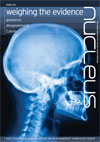David Jones reflects on how we talk abotu God's sovereignty in medicine
the sovereignty of God and healthcare
David Jones reflects on how we talk about God's sovereignty in medicine
a medical student's confession
I sometimes find it difficult when I hear the way my dear non-medical church family speaks about healing. Whether you are a charismatic or a cessationist, or somewhere in between, I'm sure you can relate. I confess that recently I have taken some comments personally. It's hard not to. After all, undergraduate medicine is long and arduous, as well as immensely mentally, emotionally, and psychologically challenging. Giving grace to Christians who make sweeping statements about medicine can prove difficult for us.
Below are three true stories from my local church, each of which has concerned me.
a testimony
I recently heard a testimony from someone who told me that a relative of theirs was very unwell and had been prescribed medication. When they heard of their relative's sickness, they paid them a visit and told them 'if pills can heal you, then God can!' They told their relative to stop taking the medication and to 'believe'. They then prayed and, thank God, their relative was healed.
a prayer
Another story I heard recently came from someone who had prayed for a man in pain. Praise God the pain vanished! Convinced that he had witnessed God's work, the Christian who prayed (who I'm sure had the best intentions) declared 'God healed him...he didn't go to a doctor!'
a gospel
A dear brother, encouraging a few of us to expect more healings in church, commented on Jesus' amazing healing ministry: 'Everyone came to Jesus. Nobody was in hospital. The hospitals were empty!'
In all three examples, it is claimed that God is glorified specifically because an apparently 'supernatural' healing occured. But might he not be glorified when someone is healed through medicine? The difference is important, and failure to understand it is frustrating.
why am I irritated if God is glorified?
I sincerely believe that in the above instances God worked. Why? Because God is sovereign; sovereign over all the Earth, all people, all situations. These events would not have occurred if he hadn't allowed them to. But, if God is fully sovereign, then he is Lord over conventional medicine also. So why do some Christians propagate the idea that if someone is healed through conventional medicine then God is not glorified? Why does God only get the credit when someone is healed through prayer?
Each of us has dedicated our lives to a ministry called 'medicine'. Indeed, if we examine our history books we will discover that the very idea of medical care for the sick was a gospel driven initiative. The Church's fingerprints have been all over western medicine since the inception of hospitals, infirmaries, doctors and nurses. Someday, when we graduate, we will inherit this legacy and stand as part of the Church in healthcare today. But, as future doctors, our ministry does not begin and end in the workplace. There is scope for us to educate the wider Church; to correct faulty thinking around medicine. Medicine is not an alternative to God; it is a vessel for God's glory, if we would only praise him for its success.
If we don't challenge church members who say 'if pills can heal you, then God can', or those who say 'God healed him...he didn't go to a doctor' we allow the falsehood that God will heal through prayer but not through medical treatment.
If we proclaim as a Church that 'Everyone came to Jesus...The hospitals were empty!' we don't even have the Bible to back up the statement. Jesus healed those who came to him, and he told the man cured of leprosy to show himself to the priest for verification of his cleansing. (Matthew 8:4). We should not suggest that God's healing cannot come through modern medicine. Also, it does not show a lack of faith to have medical verification of healing. Such errors do not reflect an omnipotent or sovereign God! Talking about God in this way denies him the glory he deserves for so much healing that goes on through healthcare. Here, it seems that there is an overlap between our duty to offer health education to the public and our theological beliefs. In love, we need to educate the Church on God's sovereignty, our service through medicine, and God's rightful receipt of praise for all healing. Our God is sovereign. He heals through prayer, people and pills.
'Our God is in heaven; he does whatever pleases him' (Psalm 115:3).
David Jones is a clinical medical student at St George's, University of London.































